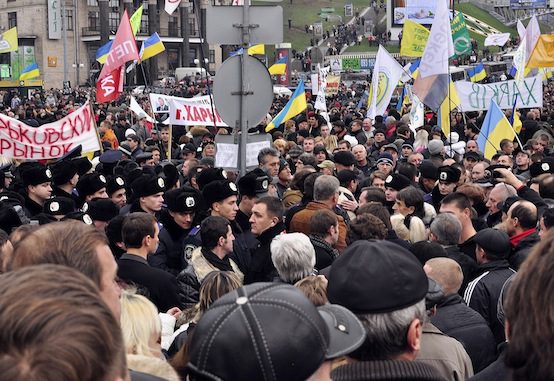From Ukraine to South Africa: The End of History (Again)?

Despite the promises of liberal internationalist elites, religious fundamentalism, ethnic identity, and the old notion of nationalism have proved more resilient than unrelenting global democratic progress, not only in Iraq, Syria, Lebanon, and Libya, but even in the advanced industrialized nations of the European Union.
Meanwhile, as the latest Pew Research opinion polls suggested, a majority of Americans have no interest in making the world safe for democracy and would prefer the United States to “mind its own business.” The American people are largely indifferent to the Freedom Agenda, and what they want, to paraphrase what Stalin once said about socialism, is liberal democracy in one country, the United States.
But after the death of South Africa’s Nelson Mandela and in the throes of continuing political unrest in Ukraine, liberal internationalism seems to be coming back to life. It’s as though we’re back where it all started, at the time of the collapse of the Soviet Empire, followed by the downfall of the apartheid regime in South Africa, with the sense that in spite of many setbacks, universal liberal democracy is once again on the march.
“The true surprise—and one that should inspire democrats around the world—is the spontaneous and spirited resistance of Ukrainian civil society” to what Chrystia Freeland described in the New York Times recently as the “thuggish leadership” of Ukraine and “Moscow’s ferocious intervention” in that country’s affairs. A “new, well-educated, well travelled, comprehensively wired generation has matured” in Ukraine, and these “young Ukrainians know the difference between democratic capitalism and state capitalism and they know which one they want,” Freeland concluded.
But didn’t we hear the same sort of arguments during the so-called Orange Revolution in 2004? Those who are depicted today as proponents of state capitalism were bashed then as “remnants of the communist elite” or “former communist party bosses” and today’s friendly yuppies, as Freeland portrays them, were hailed as democratic activists. But then the current “thuggish” president Viktor Yanukovych came to power through open and democratic elections.
The American media tend to downplay the ethnic and regional strains underlying the political tensions at the core of the color revolutions, not to mention the Arab spring. Recall that President George W. Bush was not even aware of the historical conflict between Shiites and Sunnis in Iraq when he set out to establish democracy there, and that it took some time for the press and official Washington to understand that what was happening in Iraq has less to do with the struggle for democracy and more with sectarian fighting.
Hence while there is no doubt that the current political tensions in Ukraine give expression to cultural frictions between young urbane professionals and aging conservative politicians, bureaucrats, and their business cronies, it’s also a reflection of historical antagonism and the conflicting sense of national identity among Ukrainian speakers in the Western and Central parts of the country and Russian speakers in Eastern and Southern Ukraine.
So it was not surprising that during recent elections voters in the Western and Central Ukrainian provinces voted mostly for political parties (Our Ukraine, Batkivshchyna) and presidential candidates (Viktor Yuschenko, Yulia Tymoshenko) with pro-Western platforms, while voters in the Southern and Eastern areas voted for parties (CPU, Party of Regions) and presidential candidates (Viktor Yanukovych) more oriented toward Russia. And both sides look toward outside powers (the U.S. and EU on one side; Russia on the other side) to support for policies that are rooted to some extent in historical-cultural experiences.
One could probably empathize with those Ukrainian nationalists who prefer to be linked to the EU rather than Russia (and Belorussia), and have access to the EU’s economic and cultural milieu while rejecting subservience to Russia which for many years repressed and exploited Ukraine.
In the same way, one could also identify with black South Africans who fought to liberate themselves from minority rule by the Afrikaners who had deprived them of political and economic freedoms.
The fight against apartheid has been viewed in the liberal internationalist narrative as an extension of the saga of the civil rights in the United States. In fact the struggle against apartheid took place in the confines of the West, and was aimed at the rulers of white controlled South Africa who had resisted pressure to reform a racist political structure.
The apartheid system collapsed because at the end of the day, F.W. de Klerk, like the last communist rulers in Eastern Europe (or for that matter Serbia’s Slobodan Milosevic) and their people, wanted to remain part of the West and succumbed to the pressure to change.
The same kind of pressure operates today on the leaders of Ukraine and Israel. But the Enlightenment Project as it evolved between 1789 and 1989 in the West is mostly irrelevant to the aspirations of the political elites and people in the Rest. Whether the new post-Mandela South Africa remains in the West or joins the Rest remains an open question.
Leon Hadar, senior analyst at Wikistrat, a geostrategic consulting group, is the author of Sandstorm: Policy Failure in the Middle East.